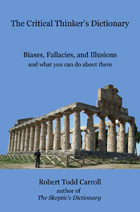From Abracadabra to Zombies | View All
communal reinforcement
Communal reinforcement is the process by which a claim becomes a strong belief through repeated assertion by members of a community. The process is independent of whether the claim has been properly researched or is supported by empirical data significant enough to warrant belief by reasonable people. Often, the mass media contribute to the process by uncritically supporting the claims. More often, however, the mass media provide tacit support for untested and unsupported claims by saying nothing skeptical about even the most outlandish of claims.
Communal reinforcement explains how entire nations can pass on ineffable gibberish from generation to generation. It also explains how testimonials reinforced by other testimonials within the community of therapists, sociologists, psychologists, theologians, politicians, talk show hosts, etc., can supplant and be more powerful than scientific studies or accurate gathering of data by disinterested parties.
Communal reinforcement explains, in part, why about
half of all American adults deny evolution occurred and believe that Abraham's god
created the universe in six days,*
made the first man and woman out of clay, and a snake talked the woman into
disobeying an order from Abraham's god thereby causing all our problems. It also
explains how otherwise rational and intelligent people can be persuaded to
accept such stories as true when they are provided by a comforting community
in a time of great emotional need. Every cult leader knows the value of
communal reinforcement combined with isolating cult members from contrary
ideas.
See also confirmation bias, selective thinking, testimonials, and wishful thinking.
For examples of beliefs deeply affected by communal reinforcement, see the following:
See also Mass Media Bunk for examples of the mass media showing no skepticism about paranormal, pseudoscientific or occult topics.
Note: There are no references for this entry because I coined this expression to describe a common phenomenon. I'm sure sociologists have a better term for it and I'm not sure that my use of this term is not an example of cryptomnesia. (I was not trying to invent a synonym for 'acculturation' or 'socialization,' but to describe one type of acculturation that happens in both large societies and small sub-groups of societies.) Google lists 3,140 English pages for "communal reinforcement" as of January 3, 2009. The Wikipedia article expands my use of the term. I had no concern for the way cultures pass on claims that are likely to be accurate, such as arithmetic or physics. I had no concern for lumping every source of error affecting large numbers of people as being due to communal reinforcement. The Wikipedia article makes an unsubstantiated claim that Wikipedia has been "criticized as a place which can strengthen misconceptions, through communal reinforcement." Wikipedia is full of errors and misconceptions but it does not pass them all on by communal reinforcement. Also, Wikipedia has expanded my use of the term when it notes that ideas that are communally reinforced can be for the social good or bad. The way I use the term ideas become accepted because they are repeated. This is always a social evil because it encourages belief without thought, reflection, or concern for the evidence.
update 22 Jan 2012. The Wikipedia article has been revised and is now much worse than it was in 2009 when I wrote the comments in the previous paragraph. The article now claims that "A possible explanation for communal reinforcement is cryptomnesia," which is absurd. It then plagiarizes from my entry on cryptomnesia. The article also has an irrelevant paragraph about an alcohol treatment program called "community-reinforcement approach," which has nothing to do with how I use the term communal reinforcement. There are other errors which I won't bother with. Just be warned that while Wikipedia is often a good source of information, don't trust it when it comes to the concept of communal reinforcement. If you are wondering why I don't rewrite the article myself, it is because of the various rules Wikipedia has about its entries. I invented the term, or at least think I invented it, for my own purposes. There are now more than 50,000 links to the term according to Google. What I meant by the term is captured by Daniel Kahneman in the following comment from Thinking, Fast and Slow: "We know that people can maintain an unshakable faith in any proposition, however absurd, when they are sustained by a community of like-minded believers" (p. 217).


